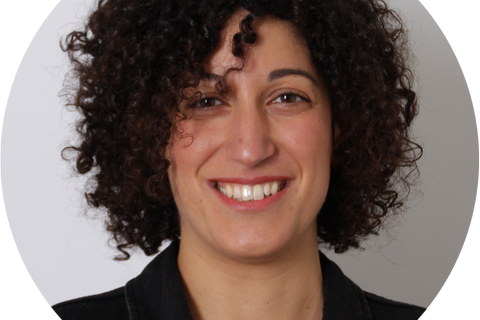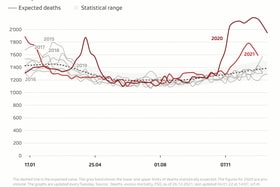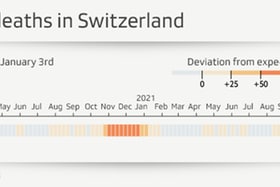In Switzerland, 2021 ended as in many countries: with a new wave of Covid-19 infections, mainly due to the micron variant. Although the data proves that vaccines protect against serious cases and death, there are still those who view science with skepticism and distrust.
This content was published on 14. Jan 2022 – 15:45
The New Year has begun where the old one ended – with dangerous viruses and meteors threatening to destroy the planet. The virus, of course, is SARS-CoV-2, which is relentlessly affecting more and more people in my circle of acquaintances. But he’s not the only one out there.
There is also a virus that causes sudden and violent intestinal flu, forcing its hosts to always stay between the bed and the bathroom. My partner contracted the infection between New Year’s Eve and the first, the moment that, for some, determines everyone’s fate for the year…
On the other hand, meteorites destined for our planet are only on screens at the moment. Over the Christmas holidays, I watched Don’t Look Up, the most talked about movie at the moment. The plot is simple: two little-known astronomers realize that a giant meteor is about to collide with Earth, but the media and the US president, who reminds us so much of Donald Trump, are not taken seriously.
what happened after that? I don’t want to spoil the movie, which is already one of Switzerland’s most popular Netflix films, but to boost morale and instill optimism, it might be best to opt for Christmas classics like “Switching Balls” or “Home Alone”.
Why is anti-vaccine sentiment spread in Switzerland?
Adam McKay’s satirical “Don’t Look Up” sure provokes some deep thoughts about our current society, which is really characterized by skepticism and mistrust of science. This phenomenon is stronger in the United States and in certain parts of Europe, particularly in German-speaking countries.
How can this be explained? Anti-vaccine sentiment appears to be closely related to anti-regime and populist politics – which often take root where power is highly decentralized – in countries such as Switzerland, Austria and Germany. Despite its wealth, Switzerland in particular has one of the lowest vaccination rates in Western Europe.
According to Susan Suggs, Professor of Communication at the University of Lugano, this trend can also be attributed to a lack of emotion in the way authorities in these countries communicate with the population. This made it easier for conspiracy theorists to fill in the existing “emotional” void.
But upon closer examination, the main reason for skepticism about vaccines in German-speaking countries is the cultural inclination of the population towards homeopathy and natural remedies, some experts say. Swiss historian Eva Loescher told SWI swissinfo.ch that this culture is derived from movements such as life repair (Life Reform), which flourished in Germany and Switzerland at the turn of the nineteenth and twentieth centuries.
In addition to preaching a close to nature lifestyle and a vegetarian or vegan diet, life repair He proposes alternative medicine and anthropological models of life, based on the philosophy of Rudolf Steiner, rather than traditional science.
Especially in the Alps, Dr. Patrick Franzoni recently told the New York Times that German-speaking residents trust fresh air, organic products, and herbal teas more than traditional medicines. Franzoni is the deputy director of the Covid unit in Bolzano, the Italian province with the largest German-speaking population and the lowest vaccination rate in the country.
Fewer doubts and more research on Covid-19 in 2022
However, the more skeptical part of the Swiss public took a hit in November, when Swiss voters overwhelmingly supported an amendment to the Covid-19 law that sets out the legal basis for “Covid testimony”.
Data on the micron variant and excess mortality over the past two years (see graphs below) could lead to the most skeptical change in their view: the data shows that vaccines work because they protect against severe forms of disease and from death.
To understand the effectiveness of vaccines, we should not focus on the number of infections. Being vaccinated doesn’t mean you won’t get sick, but it does mean you’ll be protected from the most dangerous form of disease.
Meanwhile, scientific research is progressing: four Swiss-based companies will receive government funding to develop a series of new coronavirus drugs, which are expected to be available by the end of 2022. They are aimed at treating some of the symptoms caused by Covid-19. – Such as neurological and psychiatric symptoms that mainly affect people with long-term COVID-19External link – Reducing its duration and intensity.
On the other hand, those who suffer from pelophobia (fear of needles) will be pleased to know that this month Unisanté in Lausanne will test a Covid-19 vaccine in the form of a patch on 26 volunteers.
What can nature teach us in 2022
Believing in science doesn’t mean that nature has nothing to teach us – quite the opposite: it can help us better understand who we are. Just think, for example, that homosexuality in nature has been observed in about 1,500 species, as my colleague Luigi Goriot wrote: “Individuals of many animal species can change their sex during their lifetime, and some species have tens, if not thousands, of different races.”
Such is the case with the schizophrenic community, a mushroom of 23,328 different genera, which are known as interbreeding species. Luigi interviewed Christian Krupf, biologist and curator”Eccentrics – diversity in our natureExternal linkIt is currently on display at the Museum of Natural History in Bern.
If you haven’t seen the show yet, I advise you to. Alone, with your children or even with your grandparents, friends and relatives. Realizing that nature is a wonderful spectacle of diversity is the first step towards respecting and loving ourselves and others.
Adaptation: Clarice Dominguez

“Wannabe internet buff. Future teen idol. Hardcore zombie guru. Gamer. Avid creator. Entrepreneur. Bacon ninja.”




